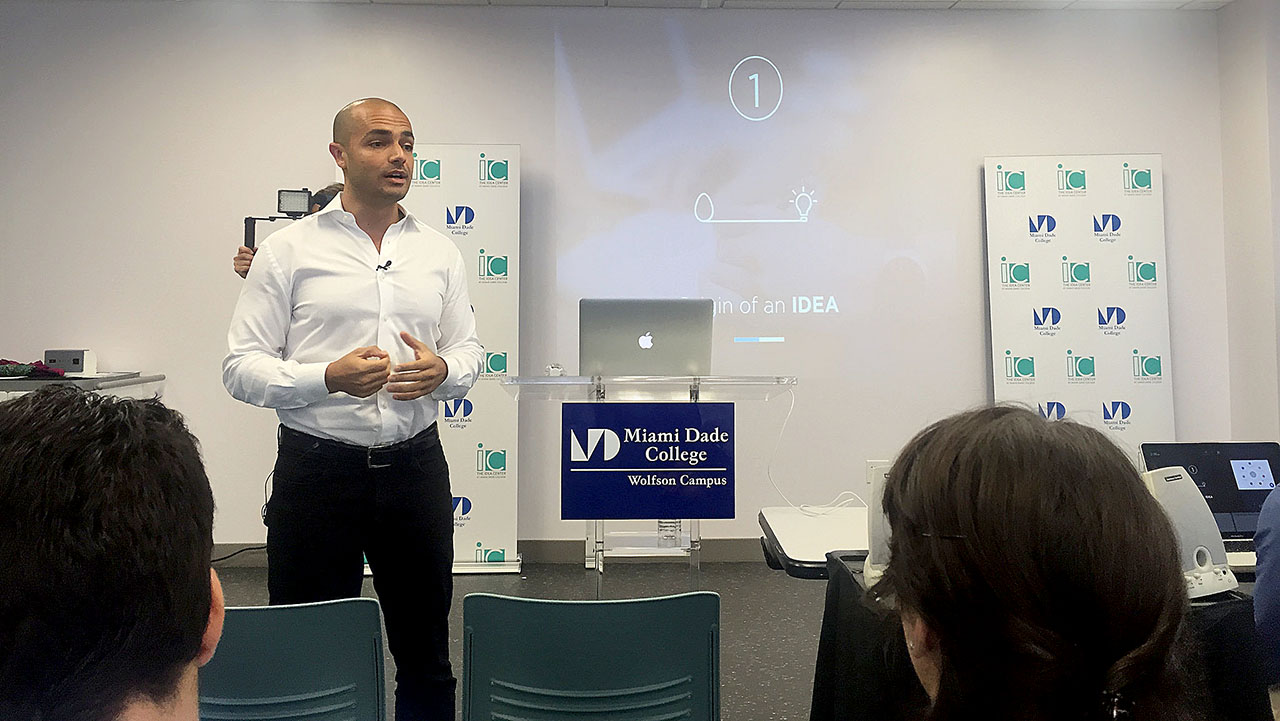
Entrepreneur Andres Moreno shares his experiences with locals hoping to find success

Photo by Alec Schwartzman.
Andres Moreno did not just happen upon success. It took the Venezuelan entrepreneur years of hard work and a bit of luck to create Open English, the leading online language school in more than 20 countries.
“Ideas are not worth much, unfortunately, unless there is a lot of execution put behind them,” Moreno said Tuesday at The Idea Center at Miami Dade College. “That is a tough thing for people to understand. A lot of entrepreneurs are frustrated because they have a lot of great ideas coming to them all the time, but until they actually decide to take the first step, they won’t become great businesses.”
Moreno spoke as part of his “Exito! con Andres Moreno” series. This appearance marks the first “Exito” (Spanish for success) event in the United States, previously only occurring in Latin America and South America. The two-hour talk was a precursor to a future full-day conference, although the date hasn’t been set.
“People want these tools; they want to hear these experiences,” Moreno said. “I started doing speaking engagements around this concept, but soon realized speaking engagements just were not enough. We wanted to organize 10 years’ worth of experiences and lessons learned into a methodology that would allow people to have a toolbox they could apply wherever they were in their stage of development. That is how ‘Exito!’ was born.”
In his talk, Moreno focused on the seven steps of building a business, using his story with Open English as a case study. According to him, a business starts with an idea. The idea then must become a product, which leads to targeting a market, understanding the competition, creating a business model, acquiring customers and raising capital.
“All businesses are obviously different, but there is a common, shared set of challenges that you just need to get right when starting one,” Moreno said. “When you have a company at such a young stage, it is like a baby. Anything can hurt it. Anything can damage it. You have to be very protective … You realize a lot of stuff is out of your control.”
Moreno learned the hard way that one of the main things a budding company cannot control is funding. In the early days of Open English, the company was on the verge of closing down and survived because of a chance loan of about $8,000 from a bank in Venezuela, Moreno said. Since then, the company has raised more than $120 million in venture capital funding. Open English employs 1,500 workers, and has 70,000 students enrolled.
“When you are an entrepreneur, you think of money in terms of months to live,” Moreno said. “We would not be here today if we had never gotten that loan from the bank.”
Moreno now helps other entrepreneurs protect and fund their ideas through angel investing. He takes an additional hands-on approach as a board member and mentor at Endeavor Global, a nonprofit helping high-impact entrepreneurs scale their businesses. Endeavor’s Miami chapter, the first U.S. affiliate, opened in 2013 with the support of Knight Foundation.
“We started the business eight years ago in very much a garage-type startup,” Moreno said. “I dropped out of engineering school to start it with a few friends … It was very much a rag-to-riches story… People are identifying with the story of Open English, not just the business. These people are also looking to start [businesses], to be successful, to take the next step in their lives.”
Moreno’s experiences carries even more relevance in Miami, a city with rapidly rising startup activity. The Idea Center had to bring in extra chairs as a seemingly never-ending stream of hopeful attendees continued to file in even after he began his talk. Local business executives, veteran entrepreneurs, college students and parents packed the room.
“The content is not just geared towards entrepreneurs; it’s a part of it, but it is geared toward anyone looking to be more innovative in their current position or job,” Moreno said. “They can be a mother who has been out of the job market for a while and is looking to find her path to professional fulfillment. It can be a student right out of school who wants to find a purpose that was not chosen for them. Everyone just wants to find success.”
Moreno encouraged entrepreneurs to live their story, and create a link between personal experiences and business missions. Growing up, Moreno lived in nine countries, in addition to frequent traveling due to his father’s position as a Venezuelan diplomat.
“Through that time, I developed a love for languages, particularly English,” Moreno said. “Once you learn it, you realize it’s not the language of one country, but a global tool for communication.”
This realization would later come into play during his engineering studies at Simón Bolívar University in Caracas. The excessive calculations, formulas and rigidity of the program inspired Moreno to think larger.
“I felt like there had to be more to life, that I could use my brain to get to solutions and solve problems in more creative ways than just the one formula,” Moreno said. “I started looking into what would later become my creative outlet: entrepreneurship.”
Alec Schwartzman is an editorial intern for Knight Foundation. Email him at [email protected] and follow him on Twitter @AMSchwartzman.
Recent Content
-
Community Impactarticle ·
-
Community Impactarticle ·
-
Community Impactarticle ·


